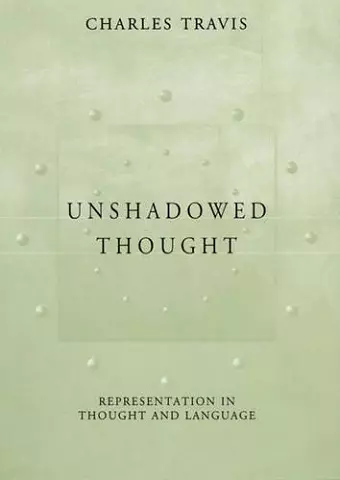Unshadowed Thought
Representation in Thought and Language
Format:Hardback
Publisher:Harvard University Press
Published:28th Feb '01
Currently unavailable, and unfortunately no date known when it will be back

This book mounts a sustained attack on ideas that are dear to many practitioners of analytic philosophy. Charles Travis targets the seductive illusion that—in Wittgenstein’s terms—“if anyone utters a sentence and means or understands it, he is operating a calculus according to definite rules.” This book rejects the idea that thoughts are essentially representational items whose content is independent of context. In doing so, it undermines the foundations of much contemporary philosophy of mind.
Travis’s main argument in Unshadowed Thought is that linguistic expressions and forms are occasion-sensitive; they cannot be abstracted out of a concrete context. With compelling examples and a thoroughgoing scrutiny of opposing positions, his book systematically works out the implications of the work of J. L. Austin, Hilary Putnam, and John McDowell. Eloquently insisting that there is no particular way one must structure what one relates to, no one way one must represent it, Unshadowed Thought identifies and resists a certain strain of semantic Platonism that permeates current philosophy—a strain that has had profoundly troubling consequences for our ideas about attitudes and beliefs and for our views about what language might be.
Unshadowed Thought presents a unifying, bold, and original account of occasion-sensitivity, a deep and important phenomenon that is unjustly neglected in contemporary philosophy of mind and language. -- Gary Ebbs, University of Illinois at Urbana-Champaign
The argument that Travis develops is systematic, meticulous, and highly specific. He manages to give a novel presentation of the anti-platonist and anti-psychologistic strands in Wittgenstein’s thought, without ever appearing merely to give an exposition of Wittgenstein’s views. By using our intuitions about what counts as expressing the same or different thoughts in particular cases, Travis works to show that the idea that thoughts are determinate representations whose individuation-conditions are occasion-independent cannot be sustained. The argument is lucid and persuasive, and the book should have considerable polemical impact. -- Marie McGinn, University of York
ISBN: 9780674003392
Dimensions: 235mm x 156mm x 30mm
Weight: 599g
288 pages